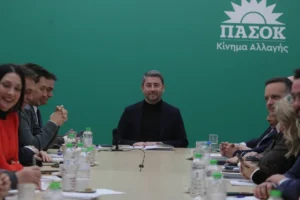Israeli Prime Minister Benjamin Netanyahu spoke by phone on Sunday with US President Donald Trump, where they discussed in detail Israel’s plans for a new military operation in the Gaza Strip.
The conversation was made public in an official statement from the Israeli prime minister’s office, which released the basic guidelines of the upcoming plan.
According to Netanyahu’s office, the two leaders discussed Israel’s goal of taking control of Hamas’ remaining strongholds in Gaza. The goal, as stated, is to end the war, free the hostages held by the Islamist organization, and totally defeat Hamas. The Israeli prime minister also thanked Trump for the steadfast and unwavering support that the US has provided to Israel since the beginning of the conflict.
Netanyahu’s plan for the Gaza Strip
Before his telephone conversation with Trump, Netanyahu gave a press conference in which he outlined Israel’s general plan for the day after the end of the conflict in Gaza. According to him, Israel intends to maintain sovereignty and security responsibility in the area, while at the same time establishing a new political administration. However, he did not provide further details on who exactly would take over this political governance and what exactly Israel’s security responsibilities would entail.
Furthermore, Netanyahu made it clear that Gaza will be completely demilitarized, while a security zone will be created along the border with Israel to prevent future attacks or terrorist acts from Palestinian territory.
The Israeli prime minister also stressed that, in close coordination with the United States, Israel had decided that the new military campaign aimed at capturing the city of Gaza would not halt efforts to deliver humanitarian aid to the Palestinian population, in an effort to strike a balance between military operations and humanitarian support.
International outcry and joint statement by five European states
Netanyahu’s plan for the complete occupation of Gaza has provoked strong reactions and condemnation from international organizations and many governments. Of particular significance is the joint statement issued by the permanent representatives of the United Kingdom, France, Denmark, Greece, and Slovenia prior to the emergency meeting of the UN Security Council on the situation in Gaza.
In their statement, the five countries condemned Israel’s decision to expand its military operations, emphasizing that such actions risk violating international humanitarian law and further exacerbating the already tragic humanitarian crisis in Gaza. Furthermore, they called on Israel to suspend the expansion of its military operations and stressed that any attempt to annex territory or expand settlements in the area constitutes a violation of international law.
They made particular reference to the dire situation of civilians, especially children, who are dying of starvation, as well as the dangerous attempts by many civilians to obtain food under extremely difficult conditions.
Netanyahu’s five conditions for ending the war
At a press conference on Sunday, Netanyahu reiterated Israel’s determination to capture the city of Gaza, describing it as “the fastest way to end the war.” At the same time, he presented the five conditions he has set for ending the conflict:
- The complete elimination of Hamas as a military and political force.
- The release of all hostages held by the Islamist organization.
- The demilitarisation of the Gaza Strip.
- Israeli control of security in the area.
- The creation of a political partnership of individuals who will represent Gaza with a peaceful orientation.
The prime minister clarified that if Hamas surrenders its weapons and complies with these conditions, then the war will end. He also stressed that his main goal is to bring back all the hostages alive from the Gaza Strip, referring specifically to the 20 hostages who are still being held.
Netanyahu’s position on the humanitarian crisis
Netanyahu also responded to criticism regarding the humanitarian crisis affecting Gaza residents, pointing out that Israel has allowed nearly two million tons of humanitarian aid into the area since the beginning of the conflict. He argued that this policy contradicts the claim that Israel is deliberately causing a humanitarian crisis, accusing Hamas instead of being responsible for the situation.
The strategy for the day after
Netanyahu’s plan is not limited to the current military operation but also includes a broader vision for Gaza after the conflict. According to him, after the demilitarization of the area, Israel will maintain control of security, while a new political administration will be created that will seek to live peacefully with Israel.
Drawing a parallel with Lebanon, where the disarmament of Hezbollah is being pursued, Netanyahu stressed that no one will be able to enter Gaza again unless Hamas is first “finished,” that is, unless its weapons are withdrawn.












